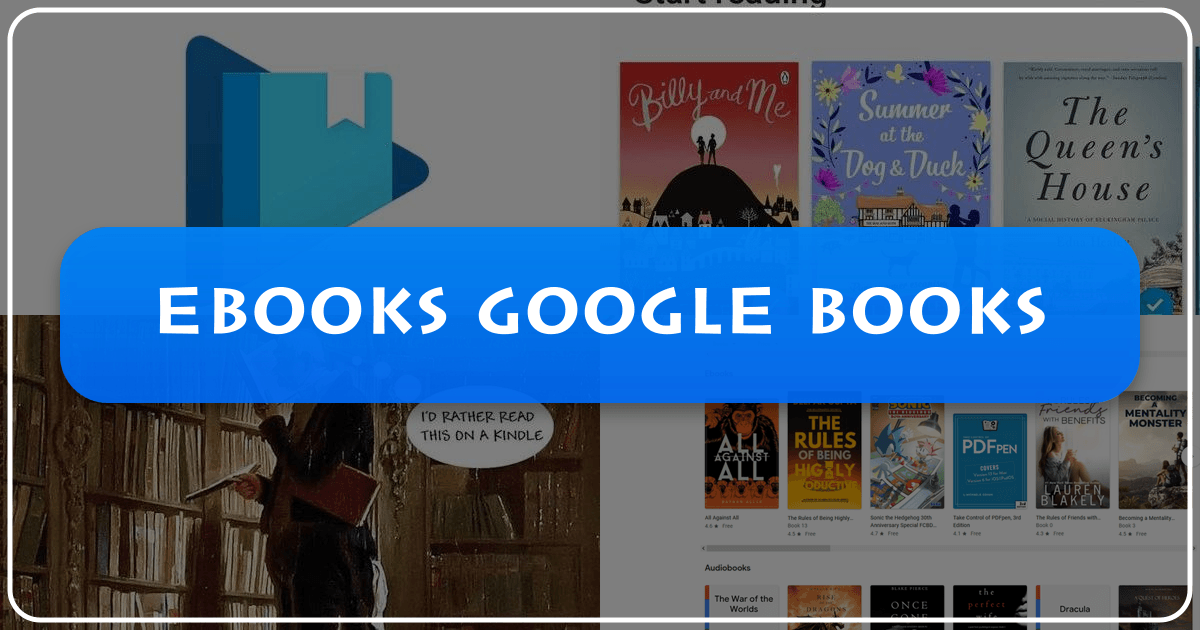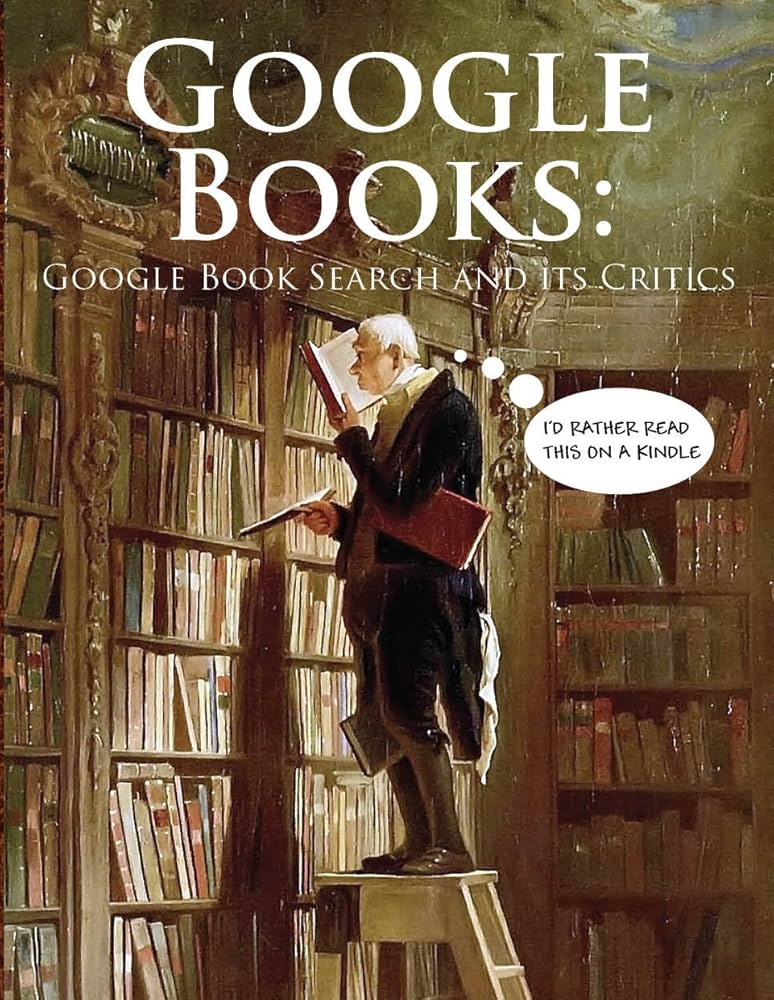eBooks and Google Books: A Comprehensive Guide

The digital age has revolutionized the way we access and consume information, and the realm of books is no exception. With the rise of ebooks and digital libraries, the traditional model of physical bookstores has been significantly augmented, offering readers unparalleled convenience and accessibility. One prominent player in this digital landscape is Google Books, a multifaceted service that encompasses a vast online library, ebook sales, and a platform for uploading personal ebooks. This article delves into the world of ebooks and Google Books, exploring its features, functionalities, and implications for readers, authors, and the broader cultural landscape.

Navigating the World of eBooks and Google Books
Google Books offers a unique blend of functionalities, catering to a wide range of user needs. It’s not just an ebook store; it’s a powerful search engine for books, a platform for self-publishing, and a gateway to a wealth of literary resources. The main functionalities can be categorized as follows:
1. Books: Google Books boasts a massive collection of ebooks, spanning a vast array of genres. From classic literature to contemporary bestsellers and new releases, the platform offers a seemingly endless selection. Users can browse by genre, search for specific titles or authors, and discover new books through personalized recommendations. Furthermore, many books feature integrated reviews, offering valuable insights from other readers before purchasing or borrowing. The sheer volume of titles available makes Google Books a go-to resource for book lovers seeking a diverse and extensive reading list. The ability to search within the full text of many digitized books, even public domain works, adds a layer of depth not found on many other ebook platforms. This full-text search capability allows for efficient research and discovery of specific information across a wide range of sources.

2. Authors: Google Books provides access to biographical information and details about the writing styles and inspirations of numerous authors. Users can explore the complete works of their favorite authors or discover new writers with similar styles or thematic interests. This rich author data enhances the reading experience by providing context and enriching the understanding of the works themselves. The inclusion of details about an author’s inspirations helps contextualize their creative processes and sheds light on the influences that shaped their writing. The emphasis on exploring the author’s life and work enables a more immersive and rewarding literary experience.
3. Reading and Learning: The platform goes beyond simple ebook access, offering resources to enhance the reading and learning experience. Many ebooks include summaries, making it easier for users to quickly grasp the main points of a work. The educational value of the books is often highlighted, making it easy to filter for specific learning objectives. The inclusion of identified “life lessons” within book descriptions enables readers to identify books aligned with their personal self-improvement goals. Finally, the emphasis on reading habits and the promotion of literacy underscore the commitment to fostering a strong reader community.
4. Libraries: Google Books acts as a virtual gateway to libraries worldwide. It provides access to the collections of numerous public and digital libraries. While not a direct substitute for physical visits to libraries, its ability to provide access to digitized materials, including rare collections and archives, significantly expands access to literary resources for users across the globe. This functionality bridges geographical limitations, allowing readers to explore materials that may not be physically available in their local libraries. The integration of such a diverse range of library collections makes Google Books a powerful tool for academic research and literary exploration.

5. Cultural Impact: Google Books documents and explores the cultural impact of literature. It highlights the literary influence of specific works and authors, charting their impact on subsequent generations of writers and thinkers. The platform often features information on adaptations of books into films, plays, or other media. The inclusion of information about awards and recognitions adds another layer of credibility and prestige to notable books and authors. Finally, Google Books facilitates the formation of online communities of readers, fostering discussions and exchanges about literary works. This multifaceted perspective enables users to explore the broader impact of literature beyond the books themselves, fostering a richer cultural understanding.
Uploading Your Own eBooks to Google Play Books
While Google Books offers an extensive library, one of its more unique features is the ability for users to upload their own ebooks. This function allows users to access their personal ebook collections through the Google Play Books platform, providing a convenient way to manage and read their personal library. However, there are limitations to this feature:
- File Formats: Only EPUB and PDF files can be uploaded. Other formats, such as MOBI, are not supported.
- DRM: Books protected by Digital Rights Management (DRM) cannot be uploaded. Google Play Books will reject any attempt to upload DRM-protected files.
- File Size: Files must be smaller than 100MB. Larger files will not be accepted by the platform.
- File Limits: Google Play Books generally limits the number of uploaded files to 1,000 or 2,000, depending on the account and any potential updates to the service.
Uploading via Different Platforms
Users can upload their ebooks through several methods:
1. Web Browser: This is perhaps the simplest approach. Using a desktop web browser, users navigate to their Google Play Books account, locate the upload button, and select the desired ebook files. The drag-and-drop functionality simplifies the process, allowing users to easily transfer files from their computer directly onto the platform. While convenient, upload times can be affected by file size and internet connection speed.
2. Android Device: Google Play Books also allows for ebook uploads directly from Android devices. Users need to enable PDF uploading in the app’s settings and then use a file manager to select the ebook file. Google Play Books will offer the option to open the file directly within the app, initiating the upload process. The upload speed, again, will depend on the file size and internet connection.
3. iOS Device: Unlike Android, uploading directly from iOS devices is not a supported feature of Google Play Books. However, books added via the web browser or an Android device are accessible and readable on iOS devices using the Google Play Books app.
Reading Your eBooks and Troubleshooting
Once ebooks are uploaded, users can read them immediately through their web browser or mobile apps. However, downloading the ebooks is recommended for offline reading, ensuring access even without an internet connection. The process of downloading is straightforward, using the menu options within the Google Play Books app.
If users encounter issues, Google Play Books provides comprehensive troubleshooting resources. While there are extensive FAQs and support articles available directly through the website and app, sometimes additional assistance might be needed. Engaging with user forums, which Google maintains on various social media and support platforms, often provides valuable insights and help from other users. Remember, community support can be an invaluable asset when tackling technical difficulties.
Google Play Books: A Comprehensive Overview
The information provided above is a synthesis from multiple sources regarding Google Books and Google Play Books, primarily focusing on the functionality of the service and how to effectively utilize its features. While the provided information is accurate to the best of my knowledge, the services, functions, and limitations of Google Play Books are constantly evolving. Therefore, it is crucial for users to directly consult the official Google Play Books documentation and help resources for the most up-to-date and accurate information. This dynamic nature of the platform ensures that readers remain at the forefront of technological advancements in the literary world. Google Books has evolved from a simple text search function to a comprehensive digital ecosystem, underscoring its significance in the present and future of reading and literature.